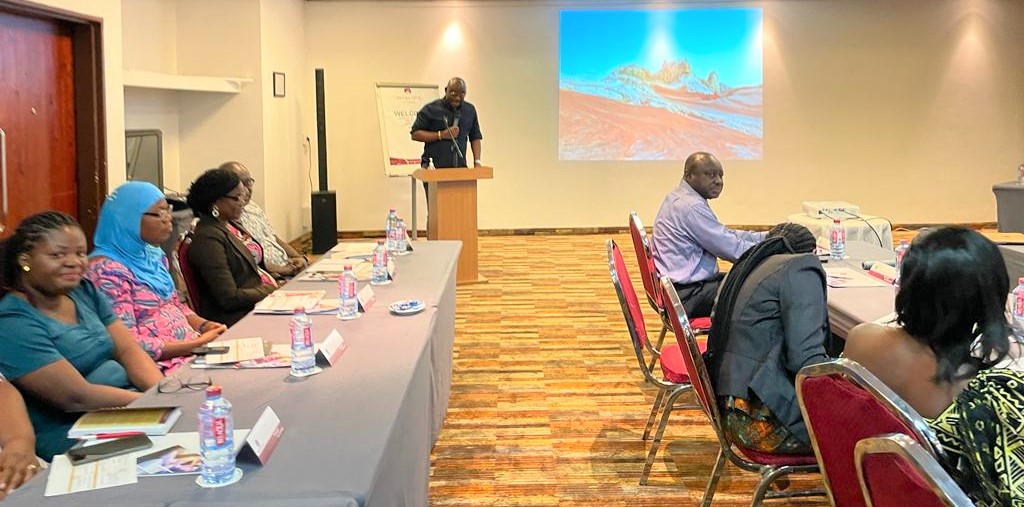Gender mainstreaming: a key to sustainable ozone depleting substance management
August 4, 2022
Jennifer Asuako, UNDP Ghana Gender Analyst addressing the workshop
Ghana, like other member states of the United Nations, is making progress towards the achievement of the Sustainable Development Goals (SDGs) and central to this effort is the agenda to leave no one behind.
In 2015, the government of Ghana adopted a National Gender policy with the main objective of mainstreaming gender equality concerns into national development processes. This policy forms part of Government’s efforts to ensure the empowerment and participation of women and girls as key stakeholders in national development processes. Despite this initiative, Gender inequality in traditionally male-dominated sectors remains a challenge.
The refrigeration sector has for some time now been male dominated both in the formal and informal areas. But given the special abilities and skills of women and girls in training, research and general management, and women being the greatest users of refrigeration, it has become necessary to consciously pursue catalytic programmes to boost their participation in the management of the sector.
In this regard, as part of the Hydrofluorocarbons Phase-Out Management Plan (HPMP) project being implemented by the Environmental Protection Agency (EPA) in collaboration with the United Nations Development Programme (UNDP), a training of trainers’ workshop was organized to empower school guidance and counselling coordinators in the Ayawaso Central Municipal Assembly. This is to help increase the interest and consciousness of young girls to pursue a career in the refrigeration sector. The HPMP project is seeking to ensure sustainable management of Ozone Depleting Substance (ODS) in refrigeration to protect the environment.
Speaking at the workshop, the Deputy Executive Director of EPA, Mr. Ebenezer Appah-Sampong underscored the need for action at all levels to protect the environment and called for a more active role of women in the sustainable management of Ozone Depleting Substance in the refrigeration and air-conditioning sector,
“This is a broad field that urgently needs the involvement of females in its management. We must leverage a stronger stakeholder approach in mainstreaming gender in this sector as that is the most effective way to stop ozone depletion”, added Mr. Appah-Sampong.
On her part, the Gender Analyst of UNDP Ghana, Jennifer Asuako emphasized the importance of gender equality in achieving the SDGs and advocated for a concerted efforts to motivate women and girls to pursue careers in the refrigeration sector.
“The fight to protect our environment is a fight for all. We must find innovative ways to inspire women and girls in this sector. Provision of financial support for girls pursuing such academic careers and more sensitizations will help encourage more females in the field”, she noted.
In his remarks, the Municipal Education Director of the Ayawaso Municipal Assembly, Mr Augustus Agyemfra identified low enrollment of females in refrigeration courses in schools as a challenge. He noted that a conscious effort will be made to ensure an increase in the number of girls’ admission to pursue refrigeration courses in second-cycle schools in his Municipality.
The participants at the workshop pledged to take a number of actions to conscientize girls in their schools towards career in the refrigeration sector.
“I will leverage the knowledge gained from this training to use Parent Teacher Association meetings to sensitize parents to allow their children take up courses in refrigeration, since parents are key influencers for their children in their choice of courses”, stated the Counsellor for the Ablekuma Central Directorate, Eva Worname.
The training saw the participation of 48 school guidance and counselling coordinators from basic schools in the municipality.

Mr. Ebenezer Appah-Sampong, EPA Deputy Executive Director delivering the opening remarks.
Augustus Agyemfra, Municipal Education Director of the Ayawaso Municipal Assembly, Mr Augustus Agyemfra addressing participants

 Locations
Locations


